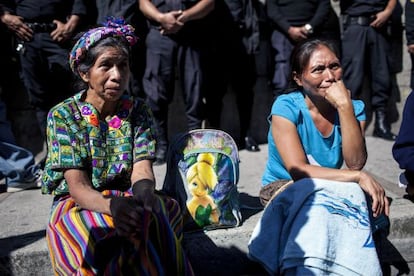Regional poverty drops to lowest level in three decades
"Current poverty and indigence rates are the lowest for three decades," says report

Growing incomes and better economic opportunities have helped bring some one million people out of poverty over the last year across Latin America and the Caribbean, a UN report released on Tuesday shows.
An estimated 167 million people in both regions - or 28.8 percent - still live below the poverty line. Nevertheless, the UN's Economic Commission for Latin America and the Caribbean (ECLAC) said in its report that this number is a sharp drop from a decade ago.
Poverty in Latin America will continue its downward trend, but at a slower rate than in recent years, thanks to projections of positive economic growth and moderate inflation for the region in 2012, according to the report, titled Social Panorama of Latin America 2012.
Among the reasons given for the slowdown in the reduction of poverty were the abundance of low-quality employment, drops in social spending and the world economic crisis, which is finally starting to have an impact on certain countries.
"Quality jobs"
"Current poverty and indigence rates are the lowest for three decades, and this is good news, but we are still facing unacceptable levels in many countries. The challenge is to generate quality jobs as part of a development model based on equality and environmental sustainability," said ECLAC executive secretary, Alicia Bárcena, in a statement released with the report.
Among the nations with the highest poverty levels are Dominican Republic, Colombia and Paraguay, according to ECLAC.
Nevertheless, the situation overall has improved over the last three decades. In 2000, an estimated 225 million people were considered poor, or about 43.9 percent of the total population at the time, the report said.
The document also addresses specific humanitarian concerns, such as care for children and the elderly, saying that this is "a fundamental issue involving profound gender discrimination and inequality that have a negative impact on women, who bear the burden of care in the form of unpaid and relatively unrecognized work." It is difficult for women to reconcile unpaid care work in the household with paid work outside the home, the paper said.
As for the disabled people in the regions, the most recent available data from various sources - which remain extremely variable in terms of gathering comparable information across these countries - around 12 percent of the Latin American and Caribbean populations are thought to be living with at least one disability, representing some 66 million residents.
Tu suscripción se está usando en otro dispositivo
¿Quieres añadir otro usuario a tu suscripción?
Si continúas leyendo en este dispositivo, no se podrá leer en el otro.
FlechaTu suscripción se está usando en otro dispositivo y solo puedes acceder a EL PAÍS desde un dispositivo a la vez.
Si quieres compartir tu cuenta, cambia tu suscripción a la modalidad Premium, así podrás añadir otro usuario. Cada uno accederá con su propia cuenta de email, lo que os permitirá personalizar vuestra experiencia en EL PAÍS.
¿Tienes una suscripción de empresa? Accede aquí para contratar más cuentas.
En el caso de no saber quién está usando tu cuenta, te recomendamos cambiar tu contraseña aquí.
Si decides continuar compartiendo tu cuenta, este mensaje se mostrará en tu dispositivo y en el de la otra persona que está usando tu cuenta de forma indefinida, afectando a tu experiencia de lectura. Puedes consultar aquí los términos y condiciones de la suscripción digital.








































